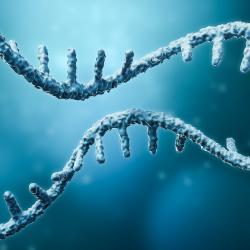CMNS Faculty Awarded Nine 2024 Teaching Innovation Grants
Awards for projects fund use of AI, DNA replication simulation and more in the classroom.
Twenty-four Teaching Innovation Grants were awarded to instructors to help boost teaching practices. Part of the University of Maryland’s strategic plan to reimagine learning, the program is awarding $1.3 million in grants in 2024 to emphasize the intersection of education and technology, including AI, virtual reality and gamification.
“The ultimate goal is for faculty to experiment, integrate technology into their courses, increase engagement and expand collaboration,” said Marcio A. Oliveira, assistant vice president of academic innovation and technology.
Three multi-year projects are focused on prototyping or testing the adoption of educational technology. The program will also fund 21 one-year projects that explore evidence-based digital teaching approaches. The one-year projects also incorporate a wide range of educational tech, whether that’s adding computer simulations to biology courses, training students in AI-assisted journalism, or using gamified scenarios for language learning.
In all, the grants are projected to bolster 73 courses with over 32,000 student seats across 10 academic units.
Faculty from the College of Computer, Mathematical, and Natural Sciences are involved in two of the three-year grants:
- Read, Watch, Play: Development of a Pedagogical Approach and Technical Infrastructure to Build Gamification, Game-Based Learning, and Other Hands-On Projects into Courses across Campus (Kendall Williams, Mathematics)
- AI-Powered Community Simulator: Revolutionizing Public Health Training (Ming Lin and Tom Goldstein, Computer Science)
CMNS faculty members are involved in seven of the one-year grants:
- Scaffolding Introductory Computer Science Education Based on Prior Education Analysis (Elias Gonzalez, Computer Science)
- Terrapin BioTools: Bioinformatics Education at UMD Through Evidence-Based Curricular Enhancements (Charles Delwiche and Adena Collens, Cell Biology and Molecular Genetics)
- Supporting a Diverse Student Population With Adaptive Learning Powered by Data Analytics (Kimberly Paczolt, Biology and David Straney, Cell Biology and Molecular Genetics)
- Computer Simulation of DNA replication for Biochemistry/Biological Sciences Courses (Jason Kahn, Chemistry and Biochemistry)
- Large Lecture just for Me - A Personalized Student Approach (Kendall Williams, Mathematics)
- Free, Accessible, and Comprehensive Course Text for Stat 400 (Jonathan Fernandes and Mestiyage Gunatilleka, Mathematics)
- Refining Mathematics Instruction through Student Feedback and Success in Research Engagements (Lawrence Washington, Mathematics)







